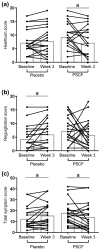Anti-Heartburn Effects of Sugar Cane Flour: A Double-Blind, Randomized, Placebo-Controlled Study
- PMID: 32570710
- PMCID: PMC7353237
- DOI: 10.3390/nu12061813
Anti-Heartburn Effects of Sugar Cane Flour: A Double-Blind, Randomized, Placebo-Controlled Study
Abstract
Gastroesophageal reflux disease (GERD) affects approximately 20% of Australians. Patients suffer a burning sensation known as heartburn due to the movement of acidic stomach content into the esophagus. There is anecdotal evidence of the effectiveness of prebiotic sugarcane flour in controlling symptoms of GERD. This pilot study aimed to investigate the effectiveness of a prebiotic sugarcane flour in alleviating symptoms in medically-diagnosed GERD patients. This pilot study was a single center, double-blinded, placebo-controlled randomized trial conducted on 43 eligible participants. The intervention group (n = 22) were randomized to receive 3 g of sugarcane flour per day, and the control group (n = 21) received 3 g of cellulose placebo per day. Symptoms of gastroesophageal reflux disease were assessed before and after three weeks treatment using the validated Gastroesophageal Reflux Disease-Health Related Quality of Life questionnaire (GERD-HRQL). After three weeks there were significant differences in symptoms for heartburn, regurgitation, and total symptoms scores (p < 0.05) between the sugarcane flour and placebo. Mean GERD-HRQL scores increased in the placebo group for regurgitation (mean increase 1.7; 95% CI 0.23 to 3.2; p = 0.015) and total symptom scores (2.9; 95% CI 0.26 to 5.7; p = 0.033). In contrast, there were significant reductions in heartburn (mean decrease -2.2; 95% CI -4.2 to -0.14; p = 0.037) and total symptom scores (-3.7; 95% CI -7.2 to -0.11; p = 0.044) in the intervention group. This pilot study has shown significant positive effects of sugarcane flour in the reduction of GERD symptoms, and a larger randomized controlled trial is warranted.
Keywords: dietary fiber; gastroesophageal reflux disease; heartburn; regurgitation; sugarcane flour.
Conflict of interest statement
The authors declare no conflict of interest.
Figures


References
-
- Ronkainen J., Aro P., Storskrubb T., Lind T., Bolling-Sternevald E., Junghard O., Talley N.J., Agreus L. Gastro-oesophageal reflux symptoms and health-related quality of life in the adult general population—The kalixanda study. Aliment. Pharmacol. Ther. 2006;23:1725–1733. doi: 10.1111/j.1365-2036.2006.02952.x. - DOI - PubMed
-
- Miller G., Wong C., Pollack A. Gastro-oesophageal reflux disease (gord) in australian general practice patients. Aust. Fam. Physician. 2015;44:701. - PubMed
Publication types
MeSH terms
Substances
LinkOut - more resources
Full Text Sources
Medical

